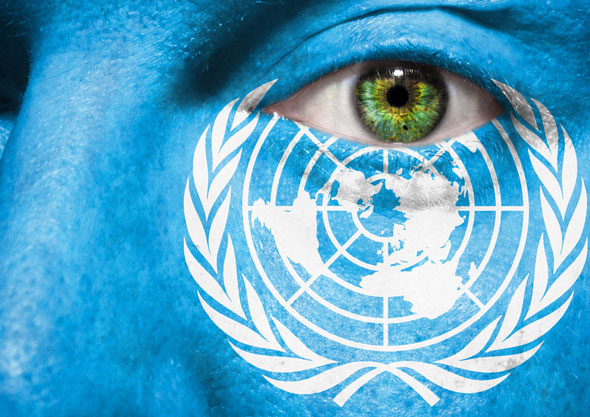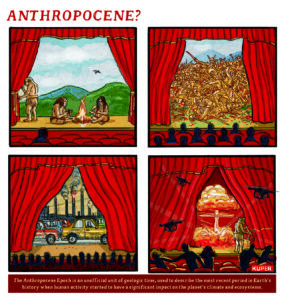The Word Nobody Wanted to Say at the U.N. Climate Action Summit
Some experts fear countries are over-relying on unpopular "offsets" rather than eliminating the use of fossil fuels to address the climate crisis. Semmick Photo / Shutterstock
Semmick Photo / Shutterstock
The leaders of more than 70 countries have made a promise that sounds nothing short of revolutionary. By 2050, they say they will reach “net zero,” putting no more carbon dioxide into the atmosphere than can be somehow canceled out.
While the net zero buzzword was as ubiquitous at last week’s United Nations Climate Action Summit as the presence of teenage activist Greta Thunberg, the details of how the countries would reach their ambitious goals were elusive. There was little talk of eliminating the use of fossil fuels, a drastic but economically tricky and politically painful step that would guarantee those emissions reductions.
Instead, some experts fear, the answer involves an overreliance on offsets, a word that has become so unfashionable, it has been replaced by euphemisms like “nature-based solutions.” In general, offsets allow polluters to get credit for cutting their own emissions by paying someone in another city, state or country to reduce theirs.
ProPublica reported on the historic failure of many setups like these, which have not actually canceled out the amount of carbon they’ve promised. After the story, the UN, which had long supported such projects, published a warning that “carbon offsets are not our get-out-of-jail free card.”
And yet, the excitement about buying and selling carbon credits was palpable at the summit, especially among those who stand to benefit from them. They gathered at a Climate Week forum hosted by the International Emissions Trading Association, an alliance including oil companies, banks and environmental consultants that get paid to run offset projects.
Shell CEO Ben van Beurden said that, because “heavy industry will not have technological solutions to just go without carbon-based energy,” alternatives for reducing CO~2~, including offsets, were “unavoidable.”
Since 2018, major oil companies including Shell have invested $50 billion in fossil fuel projects.
Van Beurden called on policy experts to create trustworthy standards so companies and countries could buy and sell carbon credits on a global scale. “In a way, I don’t care where the standard comes from … as long as it works,” he said. “We want to actually be able to make money out of this.”
Getting to net zero will likely require offsets because certain industries like aviation and shipping still lack the technology to ditch fossil fuels altogether.
The countries that have declared net zero targets only make up a small slice of global emissions, and they don’t include major polluters like China, the United States or India. While the U.S. hasn’t made the pledge as a nation, New York state has set its own benchmark. Its net zero plan, among the most ambitious in the world, calls for reducing emissions 85% by 2050 and using offsets from restoring forests and wetlands to soak up the remaining 15%.
Projects like those, which fall under the umbrella of what are called nature-based solutions, can undoubtedly help the environment, with benefits that go beyond climate change. The question is whether global funding for these programs — many of which are located in less industrialized countries with limited funding — will come as international aid or in exchange for offsets that benefit the funder.
There are no global regulations on the type and quantity of offsets that governments could use to reach net zero. Right now, most credits are sold on what’s called the voluntary market, and they don’t count toward a country’s regulatory climate goals like the ones under the Paris climate agreement, the landmark pact almost every nation made to reduce greenhouse gasses.
The momentum is headed toward approving offsets for those goals, with the heavy backing of IETA and the oil industry.
In December, politicians at the next major climate talks in Santiago, Chile, will continue to debate the rules that could enable large-scale use of offsets and carbon trading. Offsets could also get a boost under separate negotiations on airline emissions.
And this month, California regulators approved the Tropical Forest Standard, guidelines that open the door for the state and other governments to meet some of their emissions reductions by paying to preserve tropical forests.
Tzeporah Berman, a Canadian activist who spoke at a Climate Week event, said policymakers have been distracted from the bottom line: that solving the climate crisis requires keeping fossil fuels in the ground.
Last March, more than 90 researchers and academics signed a letter urging policymakers not to rely on carbon markets or offsets to solve climate change, citing a history of environmental and social problems.
Others argue that the solution to those problems isn’t to restrict offsets, but to strengthen the rules and monitoring of programs to make sure they can deliver on their carbon benefits. “We ought to focus on making sure that emissions reductions are real and verified,” Nathaniel Keohane, an environmental economist at Environmental Defense Fund, told ProPublica. “If this is a tool that can help drive down emissions, then we ought to use it.”
Keohane said that even if the world maximizes its use of offsets, major polluters like the United States won’t be able to reach net zero without also slashing their own fossil fuel use. There just aren’t enough carbon credits to do it for them.
Until countries start filling in the details of how they plan to get to net zero, Frédéric Hache, a former investment banker who scrutinizes environmental markets, worries the benefit could wind up existing only on paper. “Everybody talks about the level of ambition and nobody questions the how,” he said. “The how is at least as important, because that’s where all the greenwashing takes place.”
Independent journalism is under threat and overshadowed by heavily funded mainstream media.
You can help level the playing field. Become a member.
Your tax-deductible contribution keeps us digging beneath the headlines to give you thought-provoking, investigative reporting and analysis that unearths what's really happening- without compromise.
Give today to support our courageous, independent journalists.









You need to be a supporter to comment.
There are currently no responses to this article.
Be the first to respond.